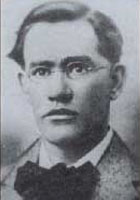A Little Boy In The Morning Poem by Francis Ledwidge
A Little Boy In The Morning
Rating: ★3.1
He will not come, and still I wait.
He whistles at another gate
Where angels listen. Ah I know
He will not come, yet if I go
How shall I know he did not pass
barefooted in the flowery grass?
The moon leans on one silver horn
Above the silhouettes of morn,
And from their nest-sills finches whistle
Or stooping pluck the downy thistle.
How is the morn so gay and fair
Without his whistling in its air?
The world is calling, I must go.
How shall I know he did not pass
Barefooted in the shining grass?
Friday, January 3, 2003
READ THIS POEM IN OTHER LANGUAGES
This poem has not been translated into any other language yet.
I would like to translate this poem
Poems By Francis Ledwidge

The memory of Francis Ledwidge evokes among Irish people a great sadness. He died a young man in the Great War. The serenity and humility of this poem demonstrates clearly our sense of loss not only of a known wonderful person but of a poet who espoused peace and tranquility. The crushing of Ledwidge's life by the Great War is mirrored in the rejection by Irish society of simple, trusted and life-enhancing values, so poignantly depicted here by Ledwidge. The unamed whistling bare-footed boy can easily be seen as a metaphor for the death of simplicity.